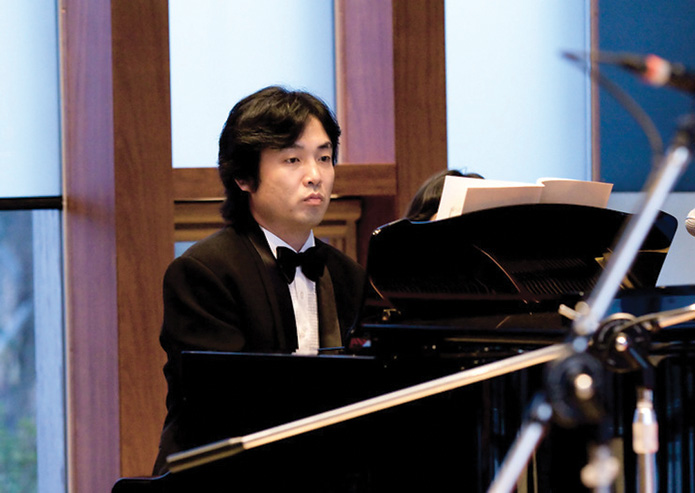Kim Cheol Woong defected from North Korea not because of hunger or fear of persecution, but for his music.
by MICHAEL LAFF
When concert pianist Kim Cheol Woong asks South Koreans to guess his profession, the most popular answer is insurance salesman. They are surprised, of course, when he tells them he’s an accomplished musician, but even more surprised when he tells them he defected from North Korea.
Tall, with a light complexion and broad build, Kim is aware that he does not match the profile of a “typical” defector. Though now a music professor and concert pianist in Seoul, Kim is ever conscious of his status as an outsider.
“I do not look like a typical defector—is that true?” Kim, dressed in a tuxedo, jokingly asked the audience gathered at the Pilgrim Church in Burke, Va., last March for one of two concerts he performed. “What does a typical defector look like?”
His recent concerts in the U.S. raised funds to help support North Korean refugees. But Kim does not push any political agenda; he believes music transcends politics. In fact, the musician defected from North Korea simply because he could not play the kind of music he loved.
“I didn’t go to South Korea for political reasons,” he told the audience. “I came to play piano.”
Kim’s musical odyssey began at a young age, a time when his talents shielded him from the state-mandated obligations his peers had to endure. After graduating from Pyongyang Music and Dance University, Kim studied for four years in Russia. In Moscow he was exposed to music that he was unlikely to hear during a lifetime in North Korea, where musicians are trained to play patriotic tunes that praised then-leader Kim Jong Il and his party. It would be French composer Richard Clayderman’s “A Comme Amour,” a romantic jazz tune that would capture the pianist’s imagination while he was in Russia and eventually lead to his decision to defect.
Upon returning to Pyongyang, he played the Clayderman tune for a woman who attracted his interest. An official heard him playing the unfamiliar Western music, and Kim was consequently forced to write a 10-page self-criticism for the offense. Kim’s father’s status as a high-level Workers Party official likely saved him from more severe punishment.
In 2001, at age 27, he stole money from his mother and fled to China. After spending time there working illegally as a logger, he, with the help of a Christian network, was able to get to South Korea in 2003. There were scant opportunities to play in the intervening years, but he was determined to be a musician again. “I defected for the sake of my music, so I didn’t have any thoughts about giving it up,” he toldKoreAm.
He made his Carnegie Hall debut in 2009, fulfilling a dream. Before the performance, he told the New York Times, “I want to show my friends and those in North Korea who must be calling me a traitor that I made the right decision. I want to tell them: Look at me, I have found my music.”
Kim, who has also performed with the London Philharmonic, possesses a performer’s flair for the dramatic. This was something he had to develop because he was unaware of such stage flourishes while living in North Korea. Realizing that he suddenly had the freedom to choose any song he wished was also daunting. He confessed that one of his greatest adjustments as a performer in South Korea was developing a repertoire. In the past, solo performances meant just playing the piano.
“Before defecting, it wasn’t something that I had to think about,” he said. “There was so much variety. The variety was a complete surprise to me.”
Unaware that musicians are accorded high status in North Korea, South Koreans often ask Kim some startling questions, such as whether the country has pianos or profess surprise that North Koreans play classical music.
Thanks to his father and mother, who worked as a language instructor, Kim lived a life of privilege in Pyongyang. He was exempt from mandatory assignments on agriculture fields or labor recruitment initiatives after the school year that most students are obliged to complete. Mostly foreigners, not the general public, attended his performances, so his knowledge of national affairs was limited. Kim said he was unaware that his countrymen suffered from severe food shortages until after he defected.
“I had heard talk about people starving and dying, but I couldn’t believe it was true,” he said.
After he defected, Kim heard that his father grew ill and died. His mother defected to the South shortly after he arrived. Kim secured her release through a broker, and she now works as a Korean languageinstructor at Hanyang University.
During his first performance in Virginia, at the Castleton Theatre House, Kim played a version of “Arirang” as part of a human rights concert. At the Pilgrim Church concert, he also played the beloved Korean folk song, along with the Clayderman tune that eventually led to his defection and a few North Korean tunes. Kim cautioned that he had no political agenda, but just wanted to give the audience a taste of North Korean music. He would like, however, to use his talent to help other defectors. He also dreams of having a combined orchestra of performers from North and South that would perform at the DMZ and Geumgang Mountain. He believes “what the military and politics cannot accomplish, music can do.”







